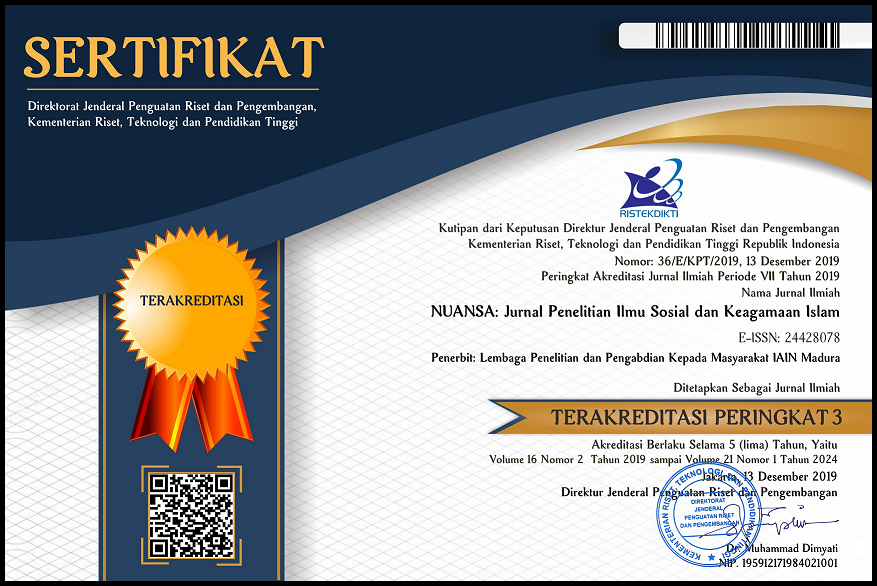Performasi Al-Qur’an Dan Konstruksi Identitas: Tren Rumah Tahfiz Pada Masyarakat Muslim Urban Kota Jambi
 Abstract views: 436
,
Abstract views: 436
,
 pdf downloads: 244
pdf downloads: 244
Abstract
This research examines the interaction between the performative Qur’an and the urban Muslim community. It takes the phenomenon of tahfiz house that has grown massively in Kota Jambi. In general, previous studies spot the tahfiz house only as an institution for learning Al-Qur’an. This study seeks to see the tahfiz house as a change in the trend of Al-Qur’an reception in the urban Muslim community Kota Jambi landscape. Having had area studies as perspective, this study seeks to show the typical characteristics of the urban Muslim community on a regional scale in the capital of Jambi city. By applying the perspective of charismatic leadership and the Muslim middle class, this study elaborates on how agencies establish tahfiz house in Kota Jambi. This study shows that the agencies play major role in the history and development of tahfiz houses Kota Jambi. The agencies are Muslim middle class. Their dependence on charismatic authority was the initial trigger for its emergence in the society. Besides that, apart from getting religious practices following urban culture, the tahfiz house can also answer and solve the issues they are experiencing. Thus, this paper concludes that, on the one hand, the tahfiz house is historically an expression of the piety of the urban Muslim community, but at the same time, it also constructs the new religious identity of the agencies
(Penelitian ini mengkaji tentang interaksi antara performasi Al-Qur’an dan masyarakat Muslim urban, dengan studi kasus fenomena rumah tahfiz yang berkembang masif di Kota Jambi. Secara umum, studi-studi sebelumnya melihat rumah tahfiz hanya sebagai lembaga pembelajaran Al-Qur’an. Penelitian ini berupaya melihat rumah tahfiz sebagai perubahan tren penerimaan Al-Qur’an dalam lanskap masyarakat Muslim urban Kota Jambi. Dengan mengambil kajian kawasan, penelitian ini berusaha untuk menunjukkan karakteristik yang khas dari masyarakat Muslim urban dalam skala regional Kota Jambi.Dengan menggunakan perspektif kepemimpinan karismatik dan kelas menengah Muslim, penelitian ini mengelaborasi bagaimana agensi bekerja dalam konteks pendirian rumah tahfiz di Kota Jambi. Penelitian ini menunjukkan bahwa sejarah dan perkembangan rumah tahfiz di Kota Jambi disebabkan karena adanya faktor agensi. Satu hal yang menjadi sentral dalam penelitian ini adalah kelompok kelas menengah Muslim yang menjadi kekuatan di balik perkembangan rumah tahfiz di Kota Jambi. Kebergantungan mereka terhadap otoritas karismatik menjadi pemicu awal dari kehadiran rumah tahfiz tersebut di masyarakat. Selain karena mendapatkan praktik keagamaan yang sesuai dengan kultur urban, rumah tahfiz turut mampu menjawab dan menjadi solusi atas permasalahan dan kegelisahan yang tengah mereka alami. Dengan demikian, penelitian ini menyimpulkan bahwa di satu sisi rumah tahfiz secara historis merupakan bentuk ekspresi kesalehan masyarakat Muslim urban, namun pada saat yang sama ia mengonstruksi identitas keagamaan baru agensinya.)
Downloads
References
Azra, A. Pendidikan Islam: Tradisi dan Moderenisasi Menuju Milenium Baru. Logos: Wacana Ilmu, 2000.
Bakar, A. Sejarah AL-Quran. Solo: CV. Ramadhani, 1948.
Barir, M. Tradisi Al-Qur’an di Pesisir: Jaringan Kiai dalam transmisi tradisi Al-Qur’an di Gerbang Islam Tanah Jawa (Cetakan pertama). Nurmahera, 2017.
Bayat, A. Making Islam Democratic: Social Movements and the Post-Islamist Turn, Stanford,Calif: Stanford University Press, 2007.
Djunaedi, W.. Sejarah qira’at al-qur’an di nusantara. Pustaka STAINU
El-Badawi, E., & Sanders, P. (Eds.). Communities of the Qur’an: Dialogue, Debate and Diversity in the 21st Century. London: Oneworld Academic, 2019
Fealy, G., & White, S. Expressing Islam: Religious Life and Politics in Indonesia. Singapore: Institute of Southeast Asian Studies, 2008.
Gade, A. M. Taste, Talent, and the Problem of Internalization: A Qur’ānic Study in Religious Musicality from Southeast Asia. History of Religions, 41. no. 4 (2002), 328–368. Retrieved from https://www.jstor.org/stable/3176452
Gade, A. M. Perfection Makes Practice: Learning, Emotion, and the Recited Quran in Indonesia. Honolulu: University of Hawaii Press, 2004.
Harahap, S. Metodologi Studi Tokoh Pemikiran Islam. Jakarta: Prenada Media Grup, 2012.
Hasan, N. The Making of Public Islam : Piety, Agency, and Commodification of The Landscape of the Indonesian Public Sphere. Contemporary Islam (2009), 229.
Hasan, N. Islam in Provincial Indonesia: Middle Class, Lifestyle, and Democracy. Journal of Islamic Studies, (2011), 121.
Hasan, H. The Role Of The Qur’an In Creating Of Civil Community Seberang Kota Jambi. 8 No. 9 (2019), 9.
Hoesterey, J. B. Marketing Morality: The Rise , Fall, and Rebranding of Aa Gym. In G. Fealy, & W. Sally, Expressing Islam: Religious Life and Politics in Indonesia (p. 91). Singapore: ISEAS, 2008.
Howell, J. D. Modulations of Active Piety: Professors and Televangelist as Promotesof Indoensian Sufism. In G. Fealy, & S. White, Expressing Islam : Relogious Life and Politics in Indonesia (p. 43). ISEAS: Yusof Ishak Institute, 2008.
Jati, W. Islam Populer sebagai Pencarian Identitas Muslim Kelas Menengah Indonesia. Teosofi: Jurnal Tasawuf Dan Pemikiran Islam, 5 (2015), 139. https://doi.org/10.15642/teosofi.2015.5.1.139-163
Jati, W. R. Politik Kelas Menengah Muslim Indonesia. Pustaka LP3ES, 2017.
Kailani, N. Aspiring to Prosperity: The Economic Theology of Urban Muslims in Contemporary Indonesia. Canberra: School of Humanities and Social Sciences UNSW, 2015
Kusnasi, E., Sobur, K., & Aziz, A.. In Between Islamic Boarding School: A Study of Al-Mubarok Al-Islam Within The Social Changers of Seberang Kota Jambi. Addin, (2017) 101-130.
Mansur, Y. Mencari Tuhan yang Hilang: 35 Kisah perjalanan Spritual Menepis Azab dan Menuai Rahmat. Bandung: Lini Zikrul Media Intelektual, 2006.
Mazzarella, W. ‘Very Bombay’: Contending with the Global in an Indian Advertising Agency. Cultural Anthropology (2003), 60.
Maghfirah, M. Performasi Al-Quran dan Konstruksi Identitas: Tren Rumah Tahfiz Pada Masyarakat Urban di Kota Jambi. UIN Sunan Kalijaga, Yogyakarta, 2021.
Makdisi, G. The rise of colleges: Institutions of learning in Islam and the West, 2017.
Mattson, I. The Story of the Qur’an: Its History and Place in Muslim Life (2nd edition). Chichester, West Sussex, UK: Wiley-Blackwell, 2013.
Muslim, A. Digital Religion and Religious Life in Southeast Asia: The One Day One Juz (ODOJ) Community in Indonesia. Asiascape: Digital Asia, 4 (2017), 33–51. https://doi.org/10.1163/22142312-12340067
Nafisah, L. Qari Selebriti: Resitasi Alquran dan Anak Muda Muslim Indonesia di Era Media Sosial. Jurnal Moderasi, 1, No. 2 (2021), 199–202.
Nelson, K.The Art of Reciting the Qur’an. Cairo ; New York: American University in Cairo Press, 2010.
Nisa, E. F. Social media and the birth of an Islamic social movement: ODOJ (One Day One Juz) in contemporary Indonesia. Indonesia and the Malay World, 46. No.134 (2018), 24–43. https://doi.org/10.1080/13639811.2017.1416758
Pariworo, T. D. “Komersialisasi dan Transformasi Orientasi Praktek Keagamaan : Analisa E-Payment 'Paytren" Ustadz Yusuf Mansur. Studia Philosophica et Theologica (2018), 119-137.
Rafiq, A. The Reception of the Qur’an in Indonesia: A case study of the place of the Qur’an in a non Arabic speaking community (2014). Retrieved from https://scholarshare.temple.edu/handle/20.500.12613/3439
Rahman, F., & Hasan, H. Kualitas Keagamaan Masyarakat Jambi dan Usaha untuk Memahami Alquran. Kontekstualita: Jurnal Penelitian Sosial Keagamaan, 28, No.1 (2013),
Rasmussen, A. Women, the Recited Qur’an, and Islamic Music in Indonesia (First edition). Berkeley: University of California Press, 2010.
Rumadi, R. Islam dan otoritas Keagamaan . Walisongo: Jurnal Penelitian Sosial Keagamaan (2012), 25-54.
Sofyan, M.The development of Tahfiz Qur'an Movement in The Reform Era in Indonesia. Heritage of Nusantara: Internasional Journal of Religious Literatur and Heritage (2015), 115-136.
Stephens, J. Introduction: The politics of identity: a transcultural perspective on subjectivity in writing for children. Subjectivity in Asian Children’s Literature and Film: Global Theories and Implications (2013), 1–18.
Triantoro, D. A. Ustaz Youtube: Ustaz Abdul Somad and The Dynamics of Changing Religious Authorities. Penamas (2020), 205-224.
Turner, B. S. Religion and Social Theory (2nd edition). London ; Newbury Park, Calif: SAGE Publications Ltd, 1991.
Turner, B. S. Religion and the modern society: Citizenship, secularization and the state. Cambridge: Cambridge University Press, 2011
Watson, C. Islamic Books And Their Publishers: Notes On The Contemporary Indonesian Scene. Journal of Islamic Studies, 16, No.2 (2005), 177–210.
Weber, M., Gerth, H. H., & Mills, C. W. 1916-1962. From Max Weber: Essays in sociology. Ulan Press, 2012.
Weber, M. Max Weber: The Theory of Social and Economic Organization. The Free Press, 1947.
Zulaili, I. N. Gerakan Dakwah Al-Quran di Indonesia: Studi Sejarah Perkembangan Gerakan Sosial PPPA Daarul Quran di Yogyakarta. UIN Sunan Kalijaga, Yogyakarta, 2018.
Elsa Widia, Sri Mona Octavia. EKSISTENSI UMKM PEREMPUAN DI MASA KRISIS: KAJIAN TANTANGAN DAN PELUANG DI KOTO TANGAH KOTA PADANG.” Journal of Applied Business and Economic (JABE) 9, no. 2 (2022): 111–26.
Widia, Elsa, and Dwipa Junika Putra. “Strategi Perluasa Pasar Menggunakan Digital Marketing Melalui Pelatihan Pembuatan Toko Online Di Kota Bukittinggi.” Diseminasi: Jurnal Pengabdian Kepada Masyarakat 5 (2023): 35–44. https://jurnal.ut.ac.id/index.php/diseminasi/article/view/3449/1367.
Yuni Maimuna, Diamond Limbong, and Sriayu Pracita. “Meningkatkan Keterlibatan Perempuan Dalam Pengembangan UMKM Berbasis Pengetahuan Khas Perempuan Kota Kendari.” Jurnal Ekonomi 27, no. 3 (2022): 399–416. https://doi.org/10.24912/je.v27i3.1114.
Copyright (c) 2023 NUANSA: Jurnal Penelitian Ilmu Sosial dan Keagamaan Islam

This work is licensed under a Creative Commons Attribution-NonCommercial 4.0 International License.
The journal operates an Open Access policy under a Creative Commons Attribution-NonCommercial 4.0 International License (CC-BY-NC) 
Authors who publish with this journal agree to the following terms:
- Authors retain copyright and grant the journal right of first publication with the work simultaneously licensed under a Creative Commons Attribution License that allows others to share the work with an acknowledgement of the work's authorship and initial publication in this journal.
- Authors are able to enter into separate, additional contractual arrangements for the non-exclusive distribution of the journal's published version of the work (e.g., post it to an institutional repository or publish it in a book), with an acknowledgement of its initial publication in this journal.
- Authors are permitted and encouraged to post their work online (e.g., in institutional repositories or on their website) prior to and during the submission process, as it can lead to productive exchanges, as well as earlier and greater citation of published work.





















